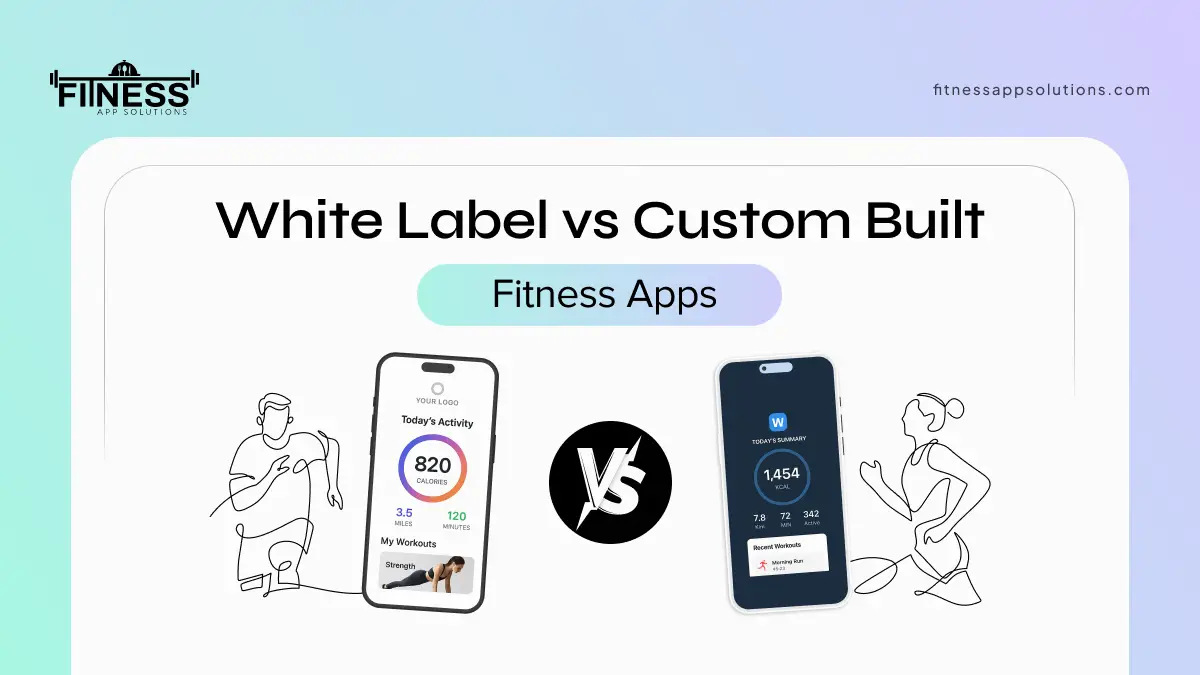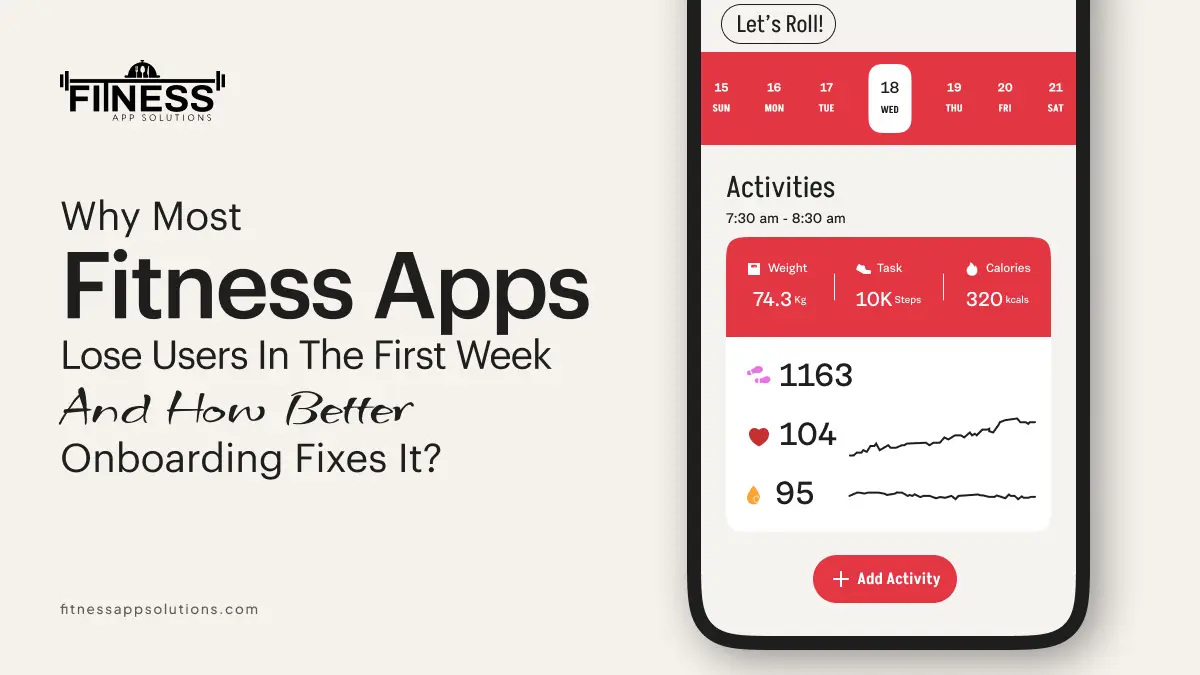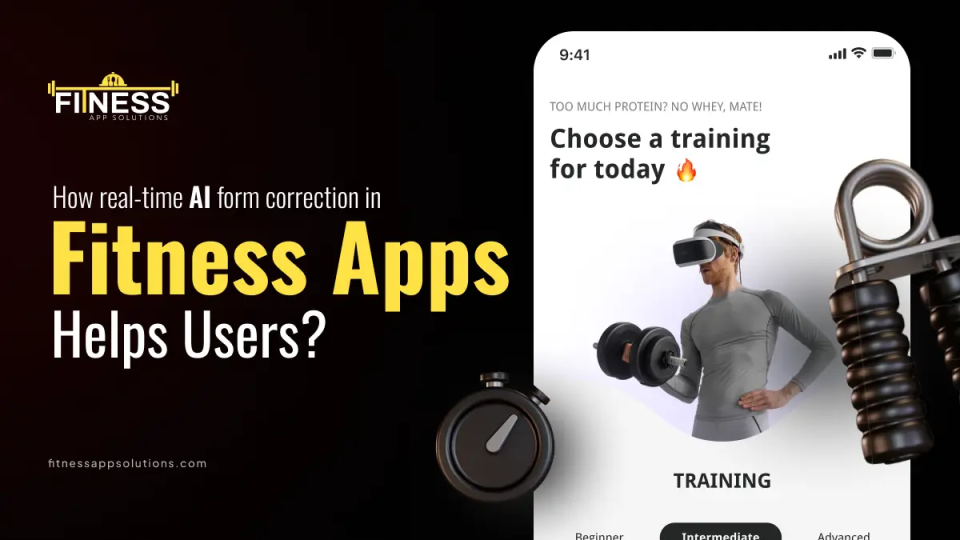Fitness apps have become indispensable tools for modern wellness businesses. They enable users to book sessions, track workouts, monitor nutrition, and connect with trainers virtually.However, developing an app from scratch or opting for a ready-made solution involves significant considerations. White label fitness apps offer a quick, cost-effective entry into the market, while custom fitness app development provides tailored solutions that reflect your unique brand identity.
The choice between white label vs custom apps hinges on factors like budget, timeline, personalization needs, and long-term growth. For instance, a small gym might prioritize speed with a white label fitness app, whereas a large franchise could invest in custom fitness app development for exclusive features. This article will dissect both options, highlighting their features, advantages, and drawbacks, to guide fitness entrepreneurs toward informed decisions.
As the demand for digital fitness solutions grows, partnering with a reputable fitness app development company ensures your app meets industry standards and user expectations. Let’s break down each approach in detail.
What do you mean by White Label Fitness Apps?
White label fitness apps are pre-built software solutions developed by third-party providers. These apps come with core functionalities that can be branded and customized to fit your business. Essentially, you “rent” the app, applying your logo, colours, and content to make it appear as your own. This model is popular among startups and small businesses looking for a low-risk way to enter the app market.
What are the Features of White Label Fitness App?
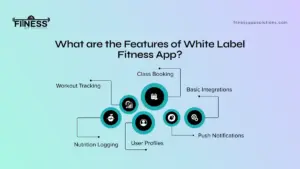
White label fitness apps typically include a range of standard features designed to cater to basic fitness needs. Key functionalities often encompass:
Workout Tracking:Users can log exercises, set goals, and monitor progress with built-in timers and calorie counters.
Nutrition Logging:Integration for meal planning, calorie tracking, and dietary recommendations.
Class Booking:Tools for scheduling and reserving fitness classes, sessions, or virtual workouts.
User Profiles:Personalized dashboards for members to view stats, achievements, and history.
Basic Integrations:Compatibility with popular wearables like fitness trackers for data syncing.
Push Notifications:Alerts for reminders, updates, and promotions.
These features are modular, allowing some level of customization, such as adding your branding or selecting from pre-existing templates. However, the core architecture remains fixed, limiting deep modifications.
What are the Pros and Cons of White Label Fitness Apps?
White label fitness apps offer several advantages that make them appealing for businesses on a tight budget or timeline.
Pros:
Speed of Deployment:You can launch the app in weeks rather than months, enabling quick market entry.
Cost-Effectiveness:Lower upfront costs compared to building from scratch, often involving subscription fees instead of large investments.
Low Technical Expertise Required:No need for an in-house development team; the provider handles maintenance and updates.
Proven Functionality:Based on tested frameworks, reducing the risk of technical failures.
Scalability for Basics: Suitable for small-scale operations with steady user bases.
Cons:
Limited Customization: You can’t alter the app’s core structure, leading to a generic feel that may not differentiate your brand.
Dependency on Provider: Reliance on the third-party for updates, support, and security, which can be restrictive.
Recurring Costs: Ongoing subscription fees can accumulate, potentially exceeding initial savings.
Ownership Issues: You don’t own the source code, making it hard to migrate or expand independently.
Potential for Overlap: Since multiple businesses use the same platform, your app might resemble competitors’, diluting brand uniqueness.
In summary, white label fitness apps are ideal for fitness businesses seeking a straightforward, budget-friendly solution without the complexities of full development. For example, many gym chains use white-label apps as a cost-effective way to provide basic fitness tracking and class scheduling features to their clients, allowing them to focus on core operations like in-person training.
What are Custom Built Fitness Apps?
In contrast, custom fitness app development involves creating an app from the ground up, tailored specifically to your business requirements. This approach allows for complete control over design, features, and functionality, ensuring the app aligns perfectly with your brand’s ethos and user needs. A dedicated fitness app development company collaborates with you to conceptualize, build, and deploy a unique solution.
What are the Features of Custom Built Fitness Apps?
Custom fitness app development enables the inclusion of bespoke features that go beyond standard offerings. Common elements include:
Advanced Workout Customization: AI-driven routines, personalized training plans, and adaptive difficulty levels based on user data.
Comprehensive Integrations: Seamless connections with wearables, CRM systems, payment gateways, and third-party APIs for enhanced functionality.
Social Features: Community forums, leaderboards, and group challenges to foster engagement.
Analytics and Reporting: In-depth dashboards for tracking user behaviour, revenue, and performance metrics.
Monetization Tools: Options for in-app purchases, subscriptions, and premium features like one-on-one coaching.
Security and Compliance: Custom-built security protocols to protect user data and comply with regulations like GDPR.
The flexibility here is immense; for example, you could integrate live streaming for virtual classes or gamification elements to boost motivation.
What are the Pros and Cons of Custom Built Fitness Apps?
Custom fitness app development provides unparalleled advantages for businesses willing to invest time and resources.
Pros:
Full Personalization: Every aspect, from UI/UX to features, can be designed to reflect your brand’s identity and values.
Ownership and Control: You retain full rights to the source code, allowing for future modifications and independence.
Scalability: Built to grow with your business, supporting expansions like multi-location operations or new service lines.
Competitive Edge: Unique features help differentiate your app in a crowded market, enhancing user loyalty.
Long-Term Value: Higher initial costs often yield better ROI through tailored monetization and reduced dependency.
Cons:
Higher Costs: Significant upfront investment for development, design, and testing.
Extended Timeline: Development can take months, delaying your market entry.
Technical Expertise Needed: Requires collaboration with a skilled fitness app development company and ongoing maintenance.
Risk of Delays: Custom projects may encounter unforeseen challenges, such as integration issues.
Resource Intensive: Demands more from your team in terms of planning and oversight.
Overall, custom fitness app development is suited for established businesses or those with specific, complex needs that off-the-shelf solutions can’t fulfil. As, large fitness platforms build fully custom solutions to integrate unique features like virtual reality workouts or personalized nutrition plans tailored to their brand, enabling them to stand out with immersive, data-driven experiences.
What is the Difference between White Label and Custom Apps?
To illustrate the differences, here’s a detailed comparison table highlighting key aspects of white label vs custom apps:
| Aspect | White Label Fitness Apps | Custom Fitness App Developmen |
|---|---|---|
| Development Time | Weeks to launch | Months for full build |
| Cost | Lower upfront, recurring subscriptions | Higher initial investment, lower long-term costs |
| Customization | Limited to branding and minor tweaks | Extensive, from features to architecture |
| Ownership | Provider-owned, no source code access | Full ownership and control |
| Scalability | Suitable for basic needs, may hit limits | Designed for growth and complex integrations |
| Maintenance | Handled by provider | Managed by your team or partner |
| Brand Differentiation | Generic feel, potential overlap with others | Unique, tailored experience |
| Risk Level | Lower technical risk, higher dependency risk | Higher initial risk, but greater rewards |
| Support | Provider-dependent | Flexible, in-house, or outsourced |
This table underscores that while white label fitness apps excel in simplicity and speed, custom fitness app development offers depth and exclusivity.
What to Choose: White Label Vs Custom Apps?
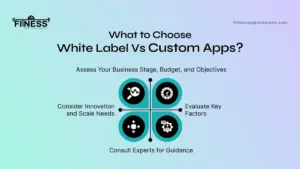
Assess Your Business Stage, Budget, and Objectives:
The choice between white label fitness apps and custom fitness app development hinges on your current position. If you are a startup or small gym with limited resources and a need for rapid deployment, white label fitness apps could be the ideal starting point. They allow you to test the waters without heavy investment.
Consider Innovation and Scale Needs:
Conversely, if your fitness brand emphasizes innovation, has a large user base, or requires specialized features like AI coaching, opt for custom fitness app development. This path is ideal for franchises or businesses aiming for market leadership.
Consult Experts for Guidance:
Consider consulting a fitness app development company to assess your specific needs and explore hybrid options, such as starting with a white label fitness app base and migrating to custom fitness app development later.
Evaluate Key Factors:
Evaluate additional elements like your target audience, competitive landscape, and growth projections. For instance, in a saturated market, the uniqueness of a custom fitness app development solution can be a game-changer.
Conclusion
The choice between white label fitness apps and custom fitness app development is pivotal for your fitness business’s digital success. White label fitness apps provide a swift, affordable entry point with essential features, perfect for quick wins. In contrast, custom fitness app development delivers bespoke solutions that enhance brand differentiation and scalability, albeit with higher costs and timelines.
Ultimately, align your decision with your vision: speed and simplicity for immediate needs, or depth and control for long-term dominance. Partnering with an experienced fitness app development company can bridge any gaps, ensuring your app not only meets current demands but also evolves with your business. Embrace the right path to transform your fitness offerings and engage users like never before.
Frequently Asked Questions (FAQs)
What are the main differences between white label fitness apps and custom fitness app development?
The primary differences lie in customization, ownership, cost, and timeline. White label fitness apps are pre-built and offer limited tweaks, while custom fitness app development allows full tailoring but requires more time and investment.
Is a fitness app development company necessary for white label solutions?
While not always essential, a fitness app development company can help with branding and integration, ensuring the app aligns with your goals.
Can I switch from a white label to a custom app later?
Yes, many businesses start with white label fitness apps and transition to custom fitness app development as they grow, though data migration may be involved.
How do costs compare for white label vs custom apps?
White label fitness apps have lower initial costs but recurring fees, whereas custom fitness app development involves higher upfront expenses with potential long-term savings.
Which option is better for brand differentiation?
Custom fitness app development excels in creating unique experiences, while white label fitness apps may result in a more generic feel.
